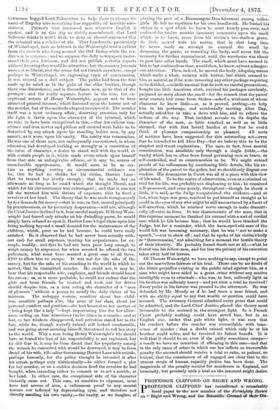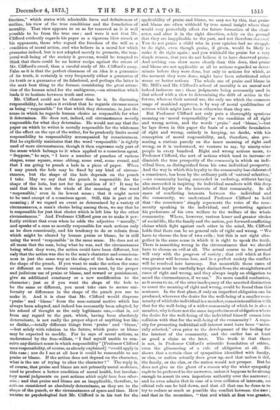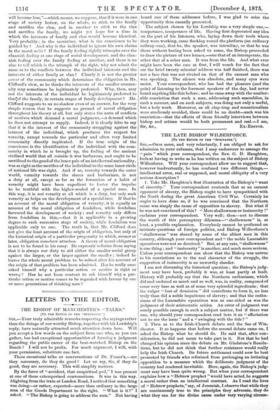P
lucid paper to the new number of the Fortnightly Review on " Right and Wrong, and the Beientifio OrOand of their Dis-
tinction," which states with admirable force and definiteness of outline, his view of the true conditions and the foundation of morality. That view appears to us as far removed as it is well possible to be from the true one ; and were it not that Mr. Clifford evidently regards his paper as a vigorous blow struck at his opponents, those who regard the freedom of the will as a condition of moral action, and who believe in a moral law which promotes indeed, but is not adapted merely to promote, the tem- poral well-being of the society it governs, would be tempted to think that there could be no better recipe against the errors of Mr. Clifford's creed,' than a careful study of Mr. Clifford's essay. False as it is that the perfect clearness of an idea is a guarantee of its truth, it certainly is very frequently either a guarantee of its truth or a guarantee of its falsehood, and perhaps the latter is the next best thing to the former, considering the great attrac- tion of the human mind for the ambiguous,—an attraction which leads it to hesitate between troth and error.
Mr. Clifford could not be clearer than he is. In discussing responsibility, he makes it evident that he regards circumstances as being "responsible" for that which they determine, in just the sense in which he regards human choice as responsible for what it determines. He does not, indeed, call circumstances morally responsible for what they determine. He would not say that the paper on which he writes is morally responsible for the whiteness of the effect on the eye of the writer, for he prudently limits moral responsibility to responsibility accompanied by consciousness. But he explicitly maintains that the word responsible ' is rightly used of mere circumstances, though it then expresses only part of the sense which belongs to it when applied to a conscious agent. " Suppose," he says, " I have a number of punches of various shapes, some square, some oblong, some oval, some round, and that I am going to punch a hole in a piece of paper. Where I may punch the hole may be fixed by any kind of circum- stances, but the shape of the hole depends on the punch I take. May we say that the punch is responsible for the shape of the hole, but not for the position of it? It may be said that this is not the whole of the meaning of the word responsible,' even in its lowest sense ; that it ought never to be used except of a conscious agent. Still, this is part of its meaning ; if we regard an event as determined by a variety of circumstances, a man's choice being among them, we say that he is responsible for just that choice which is left him by the other circumstances." And Professor Clifford goes on to make it per- fectly evident that even when he adds the adjective "morally," and speaks of a man as morally responsible for such actions only as he does consciously, and his tendency to do or refrain from which might be altered by human praise or blame, he is still using the word ' responsible ' in the same sense. He does not at all mean that the man, being what he was, and the circumstances being what they were, the action could have been different, but only that the action was due to the man's character and conscious- ness in just the same way as the shape of the hole was due .to the shape of the punch. If you want to make the action the same or different on some future occasion, you must, by the proper and judicious use of praise or blame, and reward or punishment, give an additional constancy or a new modification to the character ; just as if you want the shape of the hole to be the same or different, you must take care to secure uni- formity or difference in the shape of the punch you use to make it. And it is clear that Mr. Clifford would dispense praise' and ' blame' from the non-natural motive which has always been adopted, and indeed has necessarily been adopted, by his school of thought as the only legitimate one,—that is, not from any regard to the past, which, having been absolutely determinate, is not really the proper object of anything but like or dislike,—totally different things from 'praise' and 'blame,' —but solely with relation to the future, which praise or blame may be expected to modify. For he says of moral actions, as understood by the free-willists, " I find myself unable to con- ceive anydistinct sense in which responsibility" [Professor Clifford uses responsibility, of course, as already explained] "could apply in this case ; nor do I see at all how it could be reasonable to use praise or blame. If the action does not depend on the character, what is the use of trying to alter the character ?" The reply is, of course, that praise and blame are not primarily moral medicines, used to produce a better condition of moral health, but involun- tary moral judgments on past actions which might have been other- wise ; and that praise and blame are as inapplicable, therefore, to actiens considered as absolutely determinate, as they are to the shape of the punch, or the circumstances of space and time. How untrue to psychological fact Mr. Clifford is in his test for the applicability of praise and blame, we may see by this, that praise and blame are often withheld by true moral insight where they would very powerfully affect the future formation of the char- acter, and alter it in the right direction, solely on the ground that they are inapplicable, to the past, and not therefore deserved. You do not praise a child who in your opinion had no struggle to do right, even though praise, if given, would be likely to make it do right again ; and you withhold the praise for a very simple reason, that you do not believe it to have deserved praise. And nothing can show more clearly than this does, that praise and blame are not applicable at all to actions regarded as deter- minate before they were done, but only to actions for which, at the moment they were done, might have been substituted other worse or better actions. The whole use of praise and blame in Mr. Mill's and Mr. Clifford's school of morality is an unreal and indeed insincere use ; these judgments being necessarily used in that school with a view to determining the drift of action in the future, whereas their natural use, the only use which the common usage of mankind approves, is by way of moral qualification of actions which might have been otherwise than they are.
But Professor Clifford not only puts a thoroughly spurious meaning on moral responsibility' as the condition of all right and wrong action, and the words praise' and blame,'—but he lays down in this paper the basis of a scientific foundation Of right and wrong, entirely in keeping, no doubt, with his conception of moral responsibility, and, therefore, also pre- senting a curious parody on the inner meaning of right and wrong, as it is understood, we venture to say, by ninety-nine people in every hundred. Right and wrong actions mean, to Professor Clifford, the sort of actions which tend to increase or diminish the true prosperity of the community in which an indi- vidual lives, as distinguished from his own individual prosperity. And the way in which this loyalty to the community has elaborated a conscience, has been by the ordinary path of 'natural selection,' —no community having succeeded in enduring, •without having also succeeded in inspiring its individual members with this deep inherited loyalty to the interests of that community. In all cases of conflicting interests between the individual and the community, we understand Professor Clifford to hold that ' the conscience' simply represents the voice of the com- munity speaking in the individual, and protesting against his preference of his own welfare to the welfare of the whole community. Where, however, various lesser and greater circles of social life, like the family and the nation, put forward conflicting claims which fight against each other in the mind, Mr. Clifford holds that there can be no general rule of right and wrong. " We have to choose the less of two evils ; but this is not right alto- gether in the same sense in which it is right to speak the truth. There is something wrong in the circumstances that we should have to choose an evil at all. The actual course to be pursued will vary with the progress of society ; that evil which at first was greater will become less, and in a perfect society the conflict will be resolved into harmony. But meanwhile these cases. of exception must be carefully kept distinct from the straightforward cases of right and wrong, and they always imply an obligation to mend the circumstances, if we can." No more candid confession, as it seems to us, of the utter inadequacy of the asserted distinction to cover the meaning of right and wrong, could be found than this sentence. In the first place, if only an imperfect obligation can be produced, wherever the desire for the well-being of a smaller com- munity of which the individual is a member, comes into collision with that for the well-being of a wider community of which he is also a member, why is there not the same imperfectness of obligation where the desire for the well-being of the individual himself comes into collision with that for the well-being of the community ? A capa- city for promoting individual self-interest must have been "natu- rally selected," even prior to the development of the feeling for the interest of the community, and the earlier has at least as good a claim as the later. The truth is that there is not, in Professor Clifford's scientific foundation of ethics, even the glimmering of a rule of obligation at all. He shows that a certain class of sympathies identified with family, or clan, or nation actually does grow nyo,,and that unless it did, the family, or the clan, or the nation would not prosper. But he does not give us the ghost of a reason why the wider sympathy ought to be preferred to the narrower, unless it happens to be strong enough to assert its own imperious authority over the narrower ; and he even admits that in case of a true collision of interests, no ethical rule can be laid down, and that all that can be done is to try to reduce as much as possible the conflict between the two ; and that in the meantime, " that evil which, at first was greater, will become less,"—which means, we suppose, that if it were in one stage of society better, on the whole, to stick to the family and sacrifice the clan, and in another to stick to the clan and sacrifice the family, we might yet hope for a time in which the interests of family and clan would become identical. Very probably ; in the meantime, what is the conscience to be guided by ? And why is the individual to ignore his own claims in the moral mêlée? If the family feeling rightly triumphs over the clannish feeling at one stage of social development, and the clan- nish feeling over the family feeling at another, and there is no clue to tell which is the triumph of the right, why not admit the same as to the conflicts between the individual interests and the interests of either family or clan? Clearly it is not the greater extent of the community which determines the obligation in Mr. Clifford's view, as he thinks the interests of the smaller commu- nity may sometimes be legitimately preferred. Why, then, may not the interests of the individual be legitimately preferred to that:of the family, in certain stages of family development ? Mr. Clifford suggests to us no shadow even of an answer, for the very simple reason that he suggests no ground of moral obligation throughout his theory at all, but only states the sorts of conflicts of motives which demand a moral judgment,—a demand which he does not attempt to supply. Indeed, it is clearly false to say that it is the interest of the community struggling against the interest of the individual, which produces the respect for veracity, except towards the particular and often very limited community directly implicated. If the true origin of the conscience is the identification of the individual with the com- munity in which he is brought up, the feeling of the ancient civilised world that all outside it was barbarous, and ought to be sacrificed to the good of the inner pale of an intellectual nationality, was as right as the sacrifice of the individual to the same inner circle of national life was right. And if so, veracity towards the outer world, veracity towards the slaves and barbarians, is not a duty at all, except so far as the formation of a habit of veracity might have been expedient to foster the impulse to be truthful with the higher-souled of a special race. In this way, it is not veracity at all which is a duty, but only such veracity as helps on the development of a special race. If that be an account of the moral obligation of veracity, it is equally an account of the moral obligation of feudalism, while feudalism favoured the development of society ; and veracity only differs from feudalism in this,—that it is applicable in a growing degree to each successive stage of society, while feudalism was applicable only to one. The truth is, that Mr. Clifford does not give the least account of the origin of obligation, but only of the historical origin of a particular propensity to which, sooner or later, obligation somehow attaches. A theory of moral obligation is not to be found in his essay. He expressly refrains from saying that it is always our duty to aid either the smaller social group against the larger, or the larger against the smaller ; indeed he leaves the whole moral problem to be solved after his account of the origin of that problem has been admitted. Has he really once asked himself why a particular action or motive is right or wrong ? Has he not been content to ask himself why a par- ticular action or motive comes to be regarded with favour by one or more generations of thinking men ?








































 Previous page
Previous page